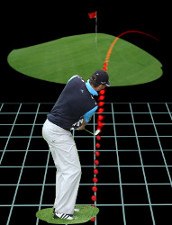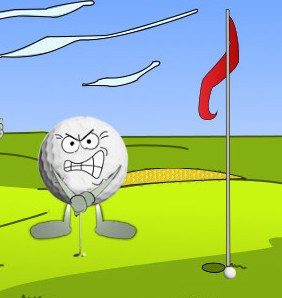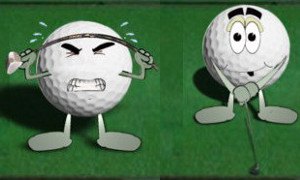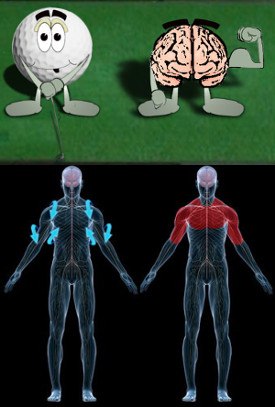The yips are not exclusive to golf. In fact, they aren't exclusive to sports. Whenever a person is unable to start or complete a movement he has practiced many times before, it could be described as a yip. Those who have been afflicted with the yipsdescribe the feeling as a spasm, cramp or having the sensation of being frozen when there should be motion. In golf the movement of the club becomes jerky and tight making the player feel like he/she has no control over the distance of the shot.

The yips are many times associated with putting although they can happen during any stroke or swing. Players that have the yips struggle with both distance control and club face control. Having high expectations is a common problem with those who battle putting yips and they seem to afflict high-level golfers more than the average golfer. Short putts are supposed to be the easiest shot in golf for a good player and developing problems with those shots is where the evolution of the yips begins.
If you are worried about yips, well, you really shouldn’t, because according to various experts (yes, there really is such a thing as a yips expert), yips are real, i.e. they are not just in your head. So, let’s begin with defying the term first. What are the yips? The Webster dictionary defines yips as a sudden and unexplained loss of skills in experienced golfers. There are two schools of thought here: some say that yips are nothing more just a loss of fine motor skills, as in there’s a physical reason for yips. The other theory is that yips are a psychological condition first and foremost. However, if that’s true, the sad news is that there’s no known therapy or treatment for yips, and the condition itself is poorly understood.
| GOLF FIXES BY PGA PROS |
|---|
| How Senior Golfers can Cure Golf Chipping Yips | Video | Article |
| Can the Putting Yips be Cured | Video | Article |
| The Cause of Short Putt Yips and How Senior Golfers can Cure this Problem | Video | Article |
| Golf Putting Cures – The Yips, What You Should Look Out For | Video | Article |
| What Causes Short Putt Yips – and The Best Cure | Video | Article |
| Chipping Yips, Causes and Cures Golf | Video | Article |
| LESSONS |
|---|
| Cure the Putting Yips- What are the Yips | Video | Article |
| Isolating The Physical Mistakes Of The Golf Yips | Video | Article |
| Confront The Problem Right Away Of Golf Putting Yips | Video | Article |
| Psychological Factors in Curing the Putting Yips | Video | Article |
| Dealing With Golf Putting Yips | Video | Article |
| The Mind Games Of Golf Putting Yips | Video | Article |
| Exercises for Curing the Putting Yips | Video | Article |
| Two Common Mechanical Errors In Golf Putting Yips | Video | Article |
| How Best to Stop Putting Yips Golf Women Putter Tip | Video | Article |
| What The Yips Look Like When Missing Short Golf Putts | Video | Article |
| When Dealing With Golf Putting Yips | Video | Article |
| How to Stop Golf Chipping Yips | Video | Article |
| Stop the Golf Putting Yips | Video | Article |
| Chipping Yips | Video | Article |
| Are the Yips a Medical Issue | Video | Article |
| PRACTICE DRILLS |
|---|
| Correct Putting Yips Golf Senior Drill Tip | Video | Article |
| GOLF QUESTIONS |
|---|
| What Are The Golfing Yips And How Can I Fix Them | Video | Article |
| What is the Best Cure for the Putting Yips? | Video | Article |
| How Can I Stop Chipping Yips? | Video | Article |
| How Can I Stop the Putting Yips? | Video | Article |
Another sad thing about yips is that many golfers are basically forced to abandon their career at the highest level, and yes, that’s due to the “yips factor”. The term yips was originally coined by Tommy Armour (yes, that guy was a golfer), and he described it as a sudden and inexplicable loss of the ability to putt correctly. Another famous golfer, Ernie Els respectively, described his problem as some kind of “short circuit” inside his brain, after he had 6 putted from 3 ft on 1 hole, and afterwards he somehow managed to miss a number of easy short putts. After that hellish round, Ernie was quoted as saying:

“I can go to that putting green now and make 20 straight 3-footers. And then you get on the course and you feel a little different and you can't do what you normally do. So it's pretty difficult.”
Basically, after all’s said and done, Ernie Els fought and lost one of his many battles with the “yips”, and again, unfortunately for our many readers, there’s no known fix for this dreadful condition which seems to affect especially golfers. Some speculate that yips is nothing more than the famous “choking under pressure” condition, but truth be told, that’s a common preconception, but in fact, it’s not really it. It’s true that anxiety can make yips worse, i.e. it can exacerbate the condition, yips can occur under any circumstance, whether one suffers from anxiety or not. According to David Owen, a popular contributor and editor for Golf Digest magazine, a guy who did massive research on yips, but let’s quote the man himself:

“Anxiety can exacerbate the yips—just as it exacerbates the tremors in Parkinson’s disease—but it’s not the cause, since the yips are usually present whether the yipper is nervous or not, and even when the yipper can’t feel them”
However, it’s worth mentioning that Ernie Els doesn’t experience yips while practicing, i.e. when the psychological pressure factor comes into play, but only during competition, and that’s pretty interesting. The Scottish golfer who coined the term yips described it as a brain spasm that messes with one’s short game, and before him, the condition formerly known as the yips (just kidding) was described as “freezing”, “the jerks”, “the staggers”, “the waggles”, “whiskey fingers” and, of course, the yips (applause). The latter seems to be winning the hearts and minds of people everywhere, hence it’s the term we use today.
It appears that more often, yips are literally some sort of neurological condition, focal dystonia respectively, which provokes involuntary movements around specific actions. For example, the most yips related trouble in Els’s particular case was apparent on short putts. And even if that may sound strange, the yips have nothing to do with Els being a bad putter. According to an extensive study on yips courtesy of Debbie Crews, who incidentally is a a sports-psychology consultant for the women's golf team at Arizona State, working together with a a sports psychologist at the Mayo Clinic in Minnesota, Aynsley M. Smith respectively, the yips seem to have a physical cause, being a neurological condition that contracts in the same time a group of muscles in the arm that don’t usually work at the same time. And we’re talking about a double pull basically, which results in a jerk, due to one group of muscles that extends the wrist, and another one that flexes it, working “on the double” in the same time.
And as we already told you in the preamble of the article, the yips condition is not limited to golf. Similar issues are common in archery, darts and shooting, i.e. sports that involve concentration and, well, one’s hands. Speaking of golf though, the biggest problem with yips is that we have no clue how and why they occur in the first place, and we’re just as bad at eliminating them. Even golf legend Tiger Woods had at some point in his career a version of the yips, in his case chipping yips, and we don’t really know if he managed to get over it, but he most probably did it somehow (he exhibited yips at some point in 2015). Here’s another Golf Digest contributor, Hank Haney, writing about yips a few years ago:

“The top scientists I've consulted say the message between your brain and your muscles gets scrambled, and the muscles start running the wrong program, like when the needle on a turntable goes over a scratch on a record. Over time, that scratch gets deeper and deeper—and the volume goes up when pressure is introduced.”
Swing diseases like yips can definitely make a golfer’s life miserable, at least for as long as he suffers from this strange condition, which is described by many as the most terrible of swing diseases. Basically, a yips-afflicted golfer will no longer be capable of exerting full control over his movements, and, the cherry on top, he’ll be basically reduced at being some sort of a passenger in a train wreck, contemplating the imminent disaster, but incapable of knowing in advance when the disaster will strike, ruining his round, hence he’s in constant fear. When the yips are installed, one’s wrists will not act as expected especially on delicate shots, such as putts and chips, and they’ll flick at the worst possible moment, leading to catastrophic shots. Yips can strike anytime anywhere, regardless of what club is being used, and will render the victim completely helpless. And again, there’s no known cure for yips.






